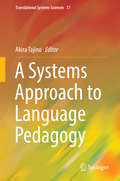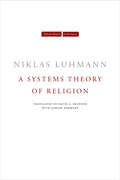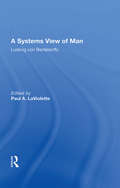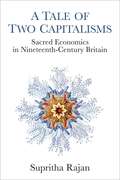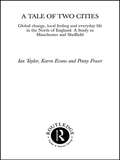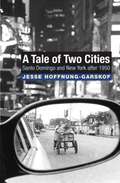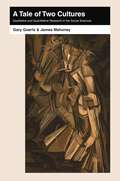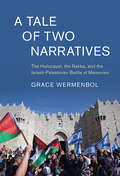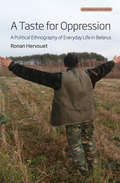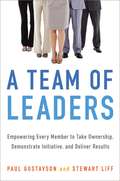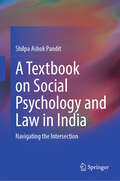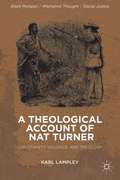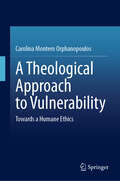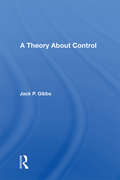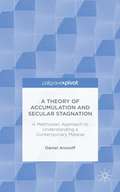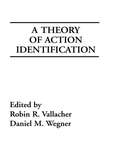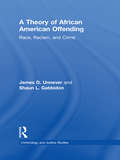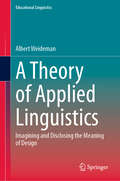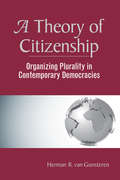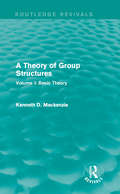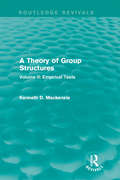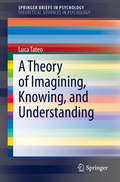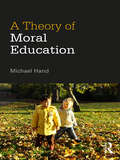- Table View
- List View
A Systems Approach to Language Pedagogy (Translational Systems Sciences #17)
by Akira TajinoThis volume represents the first attempt in the field of language pedagogy to apply a systems approach to issues in English language education. In the literature of language education, or more specifically, second or foreign language learning and teaching, each topic or issue has often been dealt with independently, and been treated as an isolated item. Taking grammar instruction as an example, grammatical items are often taught in a sequential, step-by-step manner; there has been no “road map” in which the interrelations between the various items are demonstrated. This may be one factor that makes it more difficult for students to learn the language organically. The topics covered in this volume, including language acquisition, pedagogical grammar, and teacher collaboration, are viewed from a holistic perspective. In other words, language pedagogy is approached as a dynamic system of interrelations. In this way, “emergent properties” are expected to manifest. This book is recommended for anyone involved in language pedagogy, including researchers, teachers, and teacher trainers, as well as learners.
A Systems Theory of Religion (Cultural Memory in the Present)
by Niklas LuhmannA Systems Theory of Religion, still unfinished at Niklas Luhmann's death in 1998, was first published in German two years later thanks to the editorial work of André Kieserling. One of Luhmann's most important projects, it exemplifies his later work while redefining the subject matter of the sociology of religion. Religion, for Luhmann, is one of the many functionally differentiated social systems that make up modern society. All such subsystems consist entirely of communications and all are "autopoietic," which is to say, self-organizing and self-generating. Here, Luhmann explains how religion provides a code for coping with the complexity, opacity, and uncontrollability of our world. Religion functions to make definite the indefinite, to reconcile the immanent and the transcendent. Synthesizing approaches as disparate as the philosophy of language, historical linguistics, deconstruction, and formal systems theory/cybernetics, A Systems Theory of Religion takes on important topics that range from religion's meaning and evolution to secularization, turning decades of sociological assumptions on their head. It provides us with a fresh vocabulary and a fresh philosophical and sociological approach to one of society's most fundamental phenomena.
A Systems View Of Man: Collected Essays
by Ludwig von BertalanffyWhat does it mean to be human? What distinguishes man from other animals? “Man’s creation of the universe of symbols,†replies Ludwig von Bertalanffy. “Man lives in a world not of things, but of symbols.†Dr. von Bertalanffy explores the historical development of symbolic language, examines the nature of human values, and shows how a current breakdown of symbolic universes contributes to the feeling of meaninglessness so prevalent in modern society. He notes that a major portion of mankind’s aggressive acts are not biologically induced but arise within symbolic frameworks.
A Tale Of Two Capitalisms: Sacred Economics In Nineteenth-century Britain
by Supritha RajanNo questions are more pressing today than the ethical dimensions of global capitalism in relation to an unevenly secularized modernity. A Tale of Two Capitalisms offers a timely response to these questions by reexamining the intellectual history of capitalist economics during the nineteenth century. Rajan's ambitious book traces the neglected relationships between nineteenth-century political economy, anthropology, and literature in order to demonstrate how these discourses buttress a dominant narrative of self-interested capitalism that obscures a submerged narrative within political economy. This submerged narrative discloses political economy's role in burgeoning theories of religion, as well as its underlying ethos of reciprocity, communality, and just distribution. Drawing on an impressive range of literary, anthropological, and economic writings from the eighteenth through the twenty-first century, Rajan offers an inventive, interdisciplinary account of why this second narrative of capitalism has so long escaped our notice. The book presents an unprecedented genealogy of key anthropological and economic concepts, demonstrating how notions of sacrifice, the sacred, ritual, totemism, and magic remained conceptually intertwined with capitalist theories of value and exchange in both sociological and literary discourses. Rajan supplies an original framework for discussing the ethical ideals that continue to inform contemporary global capitalism and its fraught relationship to the secular. Its revisionary argument brings new insight into the history of capitalist thought and modernity that will engage scholars across a variety of disciplines.
A Tale Of Two Cities: Global Change, Local Feeling and Everday Life in the North of England (International Library of Sociology)
by Ian Taylor Karen Evans Penny FraserA Tale of Two Cities is a study of two major cities, Manchester and Sheffield. Drawing on the work of major theorists, the authors explore the everyday life, making contributions to our understanding of the defining activities of life.
A Tale of Two Cities: Santo Domingo and New York After 1950
by Jesse Hoffnung-GarskofIn the second half of the twentieth century Dominicans became New York City's largest, and poorest, new immigrant group. They toiled in garment factories and small groceries, and as taxi drivers, janitors, hospital workers, and nannies. By 1990, one of every ten Dominicans lived in New York. A Tale of Two Cities tells the fascinating story of this emblematic migration from Latin America to the United States. Jesse Hoffnung-Garskof chronicles not only how New York itself was forever transformed by Dominican settlement but also how Dominicans' lives in New York profoundly affected life in the Dominican Republic.<P> A Tale of Two Cities is unique in offering a simultaneous, richly detailed social and cultural history of two cities bound intimately by migration. It explores how the history of burgeoning shantytowns in Santo Domingo--the capital of a rural country that had endured a century of intense U.S. intervention and was in the throes of a fitful modernization--evolved in an uneven dialogue with the culture and politics of New York's Dominican ethnic enclaves, and vice versa. In doing so it offers a new window on the lopsided history of U.S.-Latin American relations. What emerges is a unique fusion of Caribbean, Latin American, and U.S. history that very much reflects the complex global world we live in today.
A Tale of Two Cultures: Qualitative and Quantitative Research in the Social Sciences
by James Mahoney Gary GoertzSome in the social sciences argue that the same logic applies to both qualitative and quantitative methods. In A Tale of Two Cultures, Gary Goertz and James Mahoney demonstrate that these two paradigms constitute different cultures, each internally coherent yet marked by contrasting norms, practices, and toolkits. They identify and discuss major differences between these two traditions that touch nearly every aspect of social science research, including design, goals, causal effects and models, concepts and measurement, data analysis, and case selection. Although focused on the differences between qualitative and quantitative research, Goertz and Mahoney also seek to promote toleration, exchange, and learning by enabling scholars to think beyond their own culture and see an alternative scientific worldview. This book is written in an easily accessible style and features a host of real-world examples to illustrate methodological points.
A Tale of Two Narratives: The Holocaust, the Nakba, and the Israeli-Palestinian Battle of Memories (Cambridge Middle East Studies)
by Grace WermenbolThe Holocaust and the Nakba are foundational traumas in Israeli-Jewish and Palestinian societies and form key parts of each respective collective identity. This book offers a parallel analysis of the transmission of these foundational pasts in Israeli-Jewish and Palestinian societies by exploring how the Holocaust and the Nakba have been narrated since the signing of the 1993 Oslo Accords. The work exposes the existence and perpetuation of ethnocentric victimhood narratives that serve as the theoretical foundations for an ensuing minimization – or even denial – of the other's past. Three established realms of societal memory transmission provide the analytical framework for this study: official state education, commemorative acts, and mass mediation. Through this analysis, the work demonstrates the interrelated nature of the Israeli–Palestinian conflict and the contextualization of the primary historical events, while also highlighting the universal malleability of mnemonic practices.
A Taste for Oppression: A Political Ethnography of Everyday Life in Belarus (Anthropology of Europe #6)
by Ronan HervouetBelarus has emerged from communism in a unique manner as an authoritarian regime. The author, who has lived in Belarus for several years, highlights several mechanisms of tyranny, beyond the regime’s ability to control and repress, which should not be underestimated. The book immerses the reader in the depths of the Belarusian countryside, among the kolkhozes and rural communities at the heart of this authoritarian regime under Alexander Lukashenko, and offers vivid descriptions of the everyday life of Belarusians. It sheds light on the reasons why part of the population supports Lukashenko and takes a fresh look at the functioning of what has been called 'the last dictatorship in Europe'.
A Taste for Oppression: A Political Ethnography of Everyday Life in Belarus (Anthropology of Europe #6)
by Ronan HervouetBelarus has emerged from communism in a unique manner as an authoritarian regime. The author, who has lived in Belarus for several years, highlights several mechanisms of tyranny, beyond the regime’s ability to control and repress, which should not be underestimated. The book immerses the reader in the depths of the Belarusian countryside, among the kolkhozes and rural communities at the heart of this authoritarian regime under Alexander Lukashenko, and offers vivid descriptions of the everyday life of Belarusians. It sheds light on the reasons why part of the population supports Lukashenko and takes a fresh look at the functioning of what has been called 'the last dictatorship in Europe'.
A Team of Leaders: Empowering Every Member to Take Ownership, Demonstrate Initiative, and Deliver Results
by Stewart Liff Paul GUSTAVSONThe fresh approach taught in this indispensable guide will transform passive groups of disparate people into the effective teams of leaders you didn&’t know was possible to have.Every team needs a leader, but why do we often think that means the appropriate workplace team needs to consist of one gem of a worker complemented with a bunch of obedient order-takers and yes men? What if the complementary fits between the team members were not with how well they performed the tasks handed down to them but with how they all used their unique strengths to share knowledge, push the envelope, and lead together?The authors behind A Team of Leaders explain how the key to your company&’s success is creating successful teams of leaders combining their individual talents and strengths into a single, unstoppable driving force.The proven principles and techniques within these invaluable pages include:The Five-Stage Team Development Model that maps the transition from traditional to self-directed teamsBest practices in team process designA Team Value Creation Tool that allows members to appreciate the significance of what they contribute each dayVisual Management and moreA Team of Leaders shows you how to design systems within your organization and management procedures that nurture the leadership potential of every employee, not just the ones they ear-marked as having potential for promotion.
A Textbook on Social Psychology and Law in India: Navigating the Intersection
by Shilpa Ashok PanditThis textbook provides a focused and comprehensive overview of applied social psychology and its interconnections with social policy and selected laws in India. The book takes an interdisciplinary lens to view specific laws - The JJ Act(2016), the POCSO Act(2012), the MH Act(2017), the RPwD Act(2016), and the DV Act.(2005), to analyse social policy questions, the research evidence from behavioral and psychological sciences and learning for professionals in psychology as well as law. The book examines social psychological research on trauma, risk, and resilience to provide readers with a focused discussion of their administrative/implementation and therapeutic implications. The book consolidates updated research evidence from several disciplines, including the questions and debates from the Indian context. Several assignments at the end of each chapter help to delve deeper into the topics. The chapters close with implications for psychology, social work, law and public policy professionals regarding capacity building and trauma-informed care. The book is a valuable guide for students, professionals and practitioners working at the intersections of psychology, behavioural sciences, social work, law, and public policy in India.
A Theological Account of Nat Turner: Christianity, Violence, and Theology (Black Religion/Womanist Thought/Social Justice)
by Karl W. LampleyIn this unique volume, Lampley analyzes the theology of Nat Turner's violent slave rebellion in juxtaposition with Old Testament views of prophetic violence and Jesus' politics of violence in the New Testament and in consideration of the history of Christian violence and the violence embedded in traditional Christian theology.
A Theological Approach to Vulnerability: Towards a Humane Ethics
by Carolina Montero OrphanopoulosThis book explores the symbols of vulnerability, narratives of vulnerability, and ethical norms of vulnerability in the Bible. Focusing on the great Tradition of the Church—from Stoic and Neoplatonic influence to the Moral Systems—and the approach to the Second Vatican Council, the volume helps to comprehend, deepen and clarify the concept of vulnerability. As a theory, it addresses the construction of ethics of vulnerability, its characteristics, the fundamental categories it should include. Reinforced by “An Interdisciplinary Approach to Vulnerability: Towards a Humane Ethics (Vol I)”, written by the same author, this book hopes to lead the discourse of Christian ethics towards a better understanding and ultimately build towards a greater integration of the vulnerability of the human being.
A Theory About Control
by Jack P. GibbsMoving beyond his 1989 book, Control: Sociology's Central Notion, Jack Gibbs develops in this new book a comprehensive theory of control in all its biological, technological, and human dimensions. His treatment goes beyond conventional ideas about social control to show why self-control and proximate control are essential to understanding human interaction. He also argues that thinking of control in terms of the counteraction of deviance is insufficient. Tests of Gibbs's control theory, based on data from sixty-six countries, add credence to his claim that control could be the central notion for sociology and perhaps for other social sciences.
A Theory of Accumulation and Secular Stagnation: A Malthusian Approach to Understanding a Contemporary Malaise
by Daniel AronoffA Theory of Accumulation and Secular Stagnation.
A Theory of Action Identification (Basic Studies in Human Behavior Series)
by Daniel M. Wegner Robin R. VallacherFirst published in 1985. Routledge is an imprint of Taylor & Francis, an informa company.
A Theory of African American Offending: Race, Racism, and Crime (Criminology and Justice Studies)
by Shaun L. Gabbidon James D. UnneverA little more than a century ago, the famous social scientist W.E.B. Du Bois asserted that a true understanding of African American offending must be grounded in the "real conditions" of what it means to be black living in a racial stratified society. Today and according to official statistics, African American men – about six percent of the population of the United States – account for nearly sixty percent of the robbery arrests in the United States. To the authors of this book, this and many other glaring racial disparities in offending centered on African Americans is clearly related to their unique history and to their past and present racial subordination. Inexplicably, however, no criminological theory exists that fully articulates the nuances of the African American experience and how they relate to their offending. In readable fashion for undergraduate students, the general public, and criminologists alike, this book for the first time presents the foundations for the development of an African American theory of offending.
A Theory of Applied Linguistics: Ιmagining and Disclosing the Meaning of Design (Educational Linguistics #65)
by Albert WeidemanThis book adopts as conceptual focus the technical mode of experience, exploring this characteristic mode of design as the angle from which the discipline of applied linguistics takes its cue. What makes applied linguistic concept formation possible? A number of elementary concepts and ideas are so basic to the discipline that they can neither be ignored nor avoided. These ‘primitives’ are identified by examining the connections among the technical and other modalities, such as the spatial, the physical, the social, economic, aesthetic, juridical and the ethical. A theory of applied linguistics must be robust enough to do justice to different modernist and postmodernist paradigms operating in the discipline, systematically identifying and assessing their strengths and blind spots. The book offers a response to the question of the usefulness of theory. The principles of design revealed in the theoretical analysis are given shape in developing imaginative language interventions to solve vexing language problems not for the sake of theory, but for the benefit of those affected. The book is intended for use both as a reference and as a comprehensive, unifying perspective of what the field is, by scholars in applied linguistics and related fields (TESOL, ESL, ESP, EAP, SLA studies, language assessment and testing, language policy development), by postgraduate students or those who teach or study applied linguistics.
A Theory of Citizenship: Organizing Plurality in Contemporary Democracies
by Herman R. Van GunsterenDoes vital citizenship require moral consensus? Or is it the ability to organize our differences, that allows people to live together as citizens in a republic? Whereas liberal, republican, and communitarian theories of citizenship analyzed the conditions of citizenship, the central message of this book is that the practical exercise of citizenship, under conditions that are far from ideal, is the main source of its vitality. Instead of arguing for more participation, it focuses on the citizenship of those who, for whatever reason, are already active in the public sphere. Herman van Gunsteren develops a theory of citizenship well suited to the era of political reform that was inaugurated by the revolutions of 1989.
A Theory of Fairness and Social Welfare
by Marc Fleurbaey François ManiquetThe definition and measurement of social welfare have been a vexed issue for the past century. This book makes a constructive, easily applicable proposal and suggests how to evaluate the economic situation of a society in a way that gives priority to the worse-off and that respects each individual's preferences over his or her own consumption, work, leisure, and so on. This approach resonates with the current concern to go "beyond the GDP" in the measurement of social progress. Compared to technical studies in welfare economics, this book emphasizes constructive results rather than paradoxes and impossibilities, and shows how one can start from basic principles of efficiency and fairness and end up with concrete evaluations of policies. Compared to more philosophical treatments of social justice, this book is more precise about the definition of social welfare and reaches conclusions about concrete policies and institutions only after a rigorous derivation from clearly stated principles.
A Theory of Group Structures: Volume I: Basic Theory
by Kenneth D. MackenzieFirst published in 1976, this A Theory of Group Structures is a study of the aggregation of individuals into groups, which cuts across many different social sciences. Volume one attempts to formulate a more rigorous theory of group structures by providing consistent definitions, assumptions, measures, methodology, theory and results. This book will be of interest to students of all social sciences.
A Theory of Group Structures: Volume II: Empirical Tests
by Kenneth D. MackenzieFirst published in 1976, this A Theory of Group Structures is a study of the aggregation of individuals into groups, which cuts across many different social sciences. Volume two examines a sequence of twelve experiments and reports empirical tests of the theory presented in volume one. The result is a major revision of existing research into problems of group structure and a case study in paradigm development. This book will be of interest to students of all social sciences.
A Theory of Imagining, Knowing, and Understanding (SpringerBriefs in Psychology)
by Luca TateoThis is a book about imaginative work and its relationship with the construction of knowledge. It is fully acknowledged by epistemologists that imagination is not something opposed to rationality; it is not mere fantasy opposed to intellect. In philosophy and cognitive sciences, imagination is generally “delimiting not much more than the mental ability to interact cognitively with things that are not now present via the senses.” (Stuart, 2017, p. 11) For centuries, scholars and poets have wondered where this capability could come from, whether it is inspired by divinity or it is a peculiar feature of human mind (Tateo, 2017b). The omnipresence of imaginative work in both every day and highly specialized human activities requires a profoundly radical understanding of this phenomenon. We need to work imaginatively in order to achieve knowledge, thus imagination must be something more than a mere flight of fantasy. Considering different stories in the field of scientific endeavor, I will try to propose the idea that the imaginative process is fundamental higher mental function that concurs in our experiencing, knowing and understanding the world we are part of. This book is thus about a theoretical idea of imagining as constant part of the complex whole we call the human psyche. It is a story of human beings striving not only for knowledge and exploration but also striving for imagining possibilities.
A Theory of Moral Education
by Michael HandChildren must be taught morality. They must be taught to recognise the authority of moral standards and to understand what makes them authoritative. But there’s a problem: the content and justification of morality are matters of reasonable disagreement among reasonable people. This makes it hard to see how educators can secure children’s commitment to moral standards without indoctrinating them. In A Theory of Moral Education, Michael Hand tackles this problem head on. He sets out to show that moral education can and should be fully rational. It is true that many moral standards and justificatory theories are controversial, and educators have an obligation to teach these nondirectively, with the aim of enabling children to form their own considered views. But reasonable moral disagreement does not go all the way down: some basic moral standards are robustly justified, and these should be taught directively, with the aim of bringing children to recognise and understand their authority. This is an original and important contribution to the philosophy of moral education, which lays a new theoretical foundation for the urgent practical task of teaching right from wrong.
